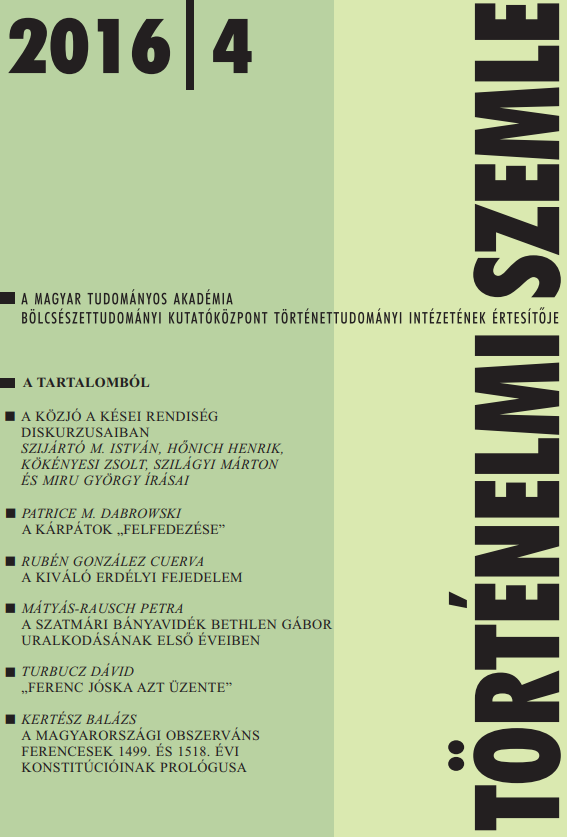„Közönséges boldogság” és „közjó” - Fogalomhasználatok Osvald Zsigmond Az igaz hazafi című művében
“Public Happiness” and “Common Good” on the Terminology of the True Patriot by Zsigmond Osvald
Author(s): Henrik HőnichSubject(s): Political history, Lexis, Semantics, Politics and communication
Published by: Magyar Tudományos Akadémia Bölcsészettudományi Kutatóközpont Történettudományi Intézet
Keywords: Public Happiness; Common Good; True Patriot; Zsigmond Osvald;
Summary/Abstract: “Common good” and “public happiness” are key conceptions of the Enlightenment. Their importance is primarily emphasized by the scholarly literature with regard to the government policies of “enlightened absolutism”, the discourses of state sciences which served as its ideological foundation, and the utterances that can be connected to the estates oriented towards the Enlightenment (felvilágosult rendiség). This, however, has not traditionally involved a thoroughgoing description of terminology. It is worth remembering the assertion of Reinhart Koselleck, according to which such concepts are always polysemic, and include a claim to generalization. This semantic stratification, however, can only be grasped in its complexity through conceptual analyses rooted in the subtle networks of concrete argumentations. The present study can accordingly be regarded as an attempt at exploring the concepts of “common good” and “public happiness” at the micro-level, based on one single text, the book by Zsigmond Osvald entitled The True Patriot. The conceptual analysis of this work, which was published in 1792, has revealed a varied and diverse semantic network connected to the two concepts. It appeared that the field of values they represent is compatible with several among the relevant contemporary argumentations and political languages. The semantic foundation of these terms was that aspect of their meaning which was dominated by the idea of solidarity with the common people and that of rendering subjected groups interested in the preservation of the existing order. This conceptual layer, however, can apparently be detached in the case of The True Patriot from that part of noble discourse in 1790 in which the idea of cooperation between particular groups of society was rather based on a paternalistic attitude towards the peasantry and on mere tactical considerations. The introduction of motives that can be connected to “popular enlightenment” [Volksaufklärung] also points in this direction, while the emphatic use of the term Politzia, corresponding to Polizei, as well as a kind of „state-centered” argumentation reflect the influence of the discourses of cameralism and state sciences. These sections of the text, however, also reveal a patriotic value hierarchy, connecting the development of the mother tongue and that of the “sciences”, meaning the contemporary treasure of knowledge, and, connected to this, aspects of civilization related to the political language of the Hungarian version of politeness. And finally, the rhetorical-discursive potential of the common good is perfectly illustrated by the central place occupied by the concept in the presentation of the relationship between king and nobility, emphasizing their mutual interdependence in the prevailing political dualism.
Journal: Történelmi Szemle
- Issue Year: 2016
- Issue No: 04
- Page Range: 505-518
- Page Count: 14
- Language: Hungarian

